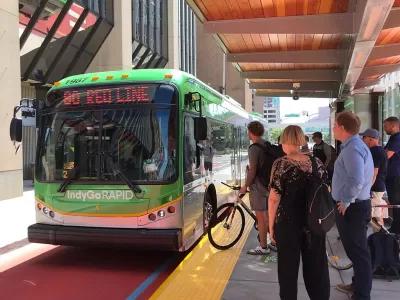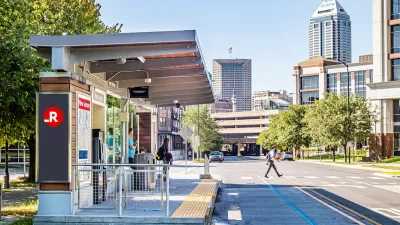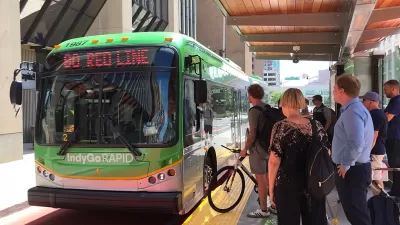Despite the temporary victory for transit advocates in Indianapolis, the battle over transit funding continuous in the Indiana General Assembly.

"Senate Bill 141, which jeopardized the planned Purple and Blue bus rapid transit lines, will not advance out of House committee by deadline," reports Ethan May. The bill won approval from the State Senate but stalled in the House Roads and Transportation Committee, according to May.
The Purple and Blue routes are planned to supplement existing BRT service that opened on the IndyGo Red Line in September 2019.
In an article from January, May explained the reasoning of State Senator Aaron Freeman (R-Indianapolis), who drafted the bill. According to that article, "Freeman said his bill is intended to protect taxpayers by holding IndyGo accountable to a 2014 law that requires the agency to raise funds to cover a certain percentage of its costs."
The IndyGo Purple and Blue lines might have won the battle, but the war is far from over. Just a few weeks after SB 141 failed in the Indiana House of Representatives, the State Senate voted to add an amendment to a utilities bill that could cost IndyGo millions, according to yet another article by May.
"Sen. Aaron Freeman, R-Indianapolis, filed the amendment to House Bill 1191. The amended bill initially dealt with local governments' ability to control utility connections. The amendment requires IndyGo to reimburse utility companies for the relocation of utilities related to projects," reports May.
FULL STORY: Bill threatening IndyGo bus rapid transit dies in the House

Study: Maui’s Plan to Convert Vacation Rentals to Long-Term Housing Could Cause Nearly $1 Billion Economic Loss
The plan would reduce visitor accommodation by 25,% resulting in 1,900 jobs lost.

North Texas Transit Leaders Tout Benefits of TOD for Growing Region
At a summit focused on transit-oriented development, policymakers discussed how North Texas’ expanded light rail system can serve as a tool for economic growth.

Why Should We Subsidize Public Transportation?
Many public transit agencies face financial stress due to rising costs, declining fare revenue, and declining subsidies. Transit advocates must provide a strong business case for increasing public transit funding.

How to Make US Trains Faster
Changes to boarding platforms and a switch to electric trains could improve U.S. passenger rail service without the added cost of high-speed rail.

Columbia’s Revitalized ‘Loop’ Is a Hub for Local Entrepreneurs
A focus on small businesses is helping a commercial corridor in Columbia, Missouri thrive.

Invasive Insect Threatens Minnesota’s Ash Forests
The Emerald Ash Borer is a rapidly spreading invasive pest threatening Minnesota’s ash trees, and homeowners are encouraged to plant diverse replacement species, avoid moving ash firewood, and monitor for signs of infestation.
Urban Design for Planners 1: Software Tools
This six-course series explores essential urban design concepts using open source software and equips planners with the tools they need to participate fully in the urban design process.
Planning for Universal Design
Learn the tools for implementing Universal Design in planning regulations.
Ascent Environmental
Borough of Carlisle
Institute for Housing and Urban Development Studies (IHS)
City of Grandview
Harvard GSD Executive Education
Toledo-Lucas County Plan Commissions
Salt Lake City
NYU Wagner Graduate School of Public Service





























